|
|
|
Sort Order |
|
|
|
Items / Page
|
|
|
|
|
|
|
| Srl | Item |
| 1 |
ID:
175215
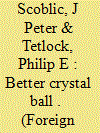

|
|
|
|
|
| Summary/Abstract |
E
verypolicy is a prediction.Tax
cuts will boost the economy.
Sanctions will slow Iran’s nuclearprogram.Travelbans will limit
the spread of COVID-19.These claims all
posit a causal relationship between
means and ends. Regardless of party,
ideology, or motive, no policymaker
wants his or her recommended course of
action to produce unanticipated consequences. This makes every policymaker
aforecaster. But forecasting is dicult,
particularly when it comes to geopolitics—a domain in which the rules of
thegame are poorly understood, information is invariably incomplete, and
expertise often confers surprisingly little
advantage in predicting future events.
These challenges present practical
problems for decision-makers in the
U.S.government.
|
|
|
|
|
|
|
|
|
|
|
|
|
|
|
|
| 2 |
ID:
184350
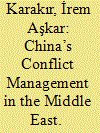

|
|
|
|
|
| Summary/Abstract |
China’s foreign policy toward the Middle East has traditionally been shaped by its national interests based on energy security, arms exports, and technology transfers. To complement its interest-driven regional policies, China has expanded its diplomatic contacts and promoted cultural ties. Over the last two decades, China has also engaged in conflict management in several regional issues, despite its declared commitment to nonintervention in other countries’ domestic affairs. This article aims to analyze China’s conflict management policies in the region, focusing on the Israeli–Palestinian conflict, Iran’s nuclear program and the Syrian conflict. Compared with other major external powers, prospects for China’s conflict management seem high given two significant advantages. First, unlike Western powers or Russia, China has not left any bitter taste in the region associated with colonialism, religious or historical engagement. Secondly, China has been careful not to take clear-cut sides in regional conflicts, making itself an ideal candidate to act as an honest broker. It is argued that despite these advantages, Chinese conflict management in the region has remained considerably modest and lacked any practical solutions to the critical problems.
|
|
|
|
|
|
|
|
|
|
|
|
|
|
|
|
| 3 |
ID:
146346
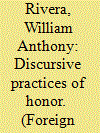

|
|
|
|
|
| Summary/Abstract |
This paper examines the role of honor in the factional competition that shapes Iran’s nuclear program foreign policy preference formation. The literature on Iranian foreign policy recognizes the nature of that process as highly factionalized. I contend that honor plays a significant role in Iran’s factional competition and foreign policy preferences because standing within the Iranian system and Iran’s standing in the international system are intertwined phenomena. Since Iran’s standing in the international system, as a nation-state, reflects back on the political elite as a whole, honor is both an important element in how the Iranian political elite compete for power and how Iran views its relationship with the United States. The role of honor in the factional competition is intensified by Iran’s nuclear program that is wrapped in nationalistic, anti-imperialistic, and revolutionary honor terms. Therefore, any member of Iran’s political elite that can be cast as surrendering Iran’s “right” to enrichment, for example, is called a traitor and is publicly shamed. I bring this to light by examining the discursive practices of honoring and shaming intrinsic to the factional competition for control of Iran’s nuclear foreign policy decision-making.
|
|
|
|
|
|
|
|
|
|
|
|
|
|
|
|
| 4 |
ID:
141314
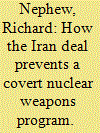

|
|
|
|
|
| Summary/Abstract |
On July 14, Iran and the six-country group known as the P5+1 (China, France, Germany, Russia, the United Kingdom, and the United States) reached an agreement on Iran’s nuclear program that promises to end the 13 years of escalating tensions that Tehran’s nuclear ambitions have caused.
|
|
|
|
|
|
|
|
|
|
|
|
|
|
|
|
| 5 |
ID:
107377
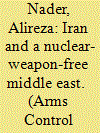

|
|
|
|
|
| Publication |
2011.
|
| Summary/Abstract |
A nuclear-weapon-free zone for the Middle East was first proposed by Iran in 1974.[1] Iran's last reigning monarch, Shah Mohammad Reza Pahlavi, championed the idea of such a zone, perhaps as a way to enhance Iran's leadership role in the region despite his own nuclear ambitions. The Islamic Republic of Iran, which replaced the monarchy in 1979, is believed to be pursuing a nuclear weapons capability despite intense international diplomatic and economic pressure. Nevertheless, Iranian leaders, who claim that Iran's nuclear program is peaceful, have been enthusiastic about the planned 2012 conference on establishing a Middle Eastern zone free of weapons of mass destruction (WMD). The conference could serve Iran's geopolitical interests by providing an opportunity to exploit Arab divisions and shift the focus away from Iran toward Israel's nuclear arsenal, thereby undermining U.S. efforts to stop the Iranian nuclear program.
|
|
|
|
|
|
|
|
|
|
|
|
|
|
|
|
| 6 |
ID:
107379
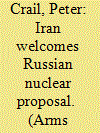

|
|
|
|
|
| Publication |
2011.
|
| Summary/Abstract |
Senior Iranian officials last month welcomed a Russian-proposed "step-by-step" process to address concerns about Iran's nuclear program, a move that could potentially restart talks between six major world powers and Iran.
|
|
|
|
|
|
|
|
|
|
|
|
|
|
|
|
| 7 |
ID:
121692
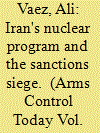

|
|
|
|
|
| Publication |
2013.
|
| Summary/Abstract |
The latest round of nuclear talks between Iran and the P5+1 (the five permanent members of the Security Council plus Germany) in the Kazakh city of Almaty yielded no results. The two sides remained poles apart.
|
|
|
|
|
|
|
|
|
|
|
|
|
|
|
|
| 8 |
ID:
121718


|
|
|
|
|
| Publication |
2013.
|
| Summary/Abstract |
Iran's newly elected president, Hassan Rouhani, said he hopes for "more active negotiations" with six world powers over Tehran's controversial nuclear program after he takes office on Aug. 3.
|
|
|
|
|
|
|
|
|
|
|
|
|
|
|
|
| 9 |
ID:
141553
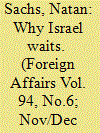

|
|
|
|
|
| Summary/Abstract |
Israeli national security strategy can seem baffling. Many observers in the United States and Europe, for example, wonder how Israeli Prime Minister Benjamin Netanyahu could have warned for years that Iran’s nuclear program posed an existential threat to Israel yet has balked at the international community’s attempts to defang it. By raising concerns about the nuclear deal between Iran and five great powers without offering a convincing alternative, Netanyahu has appeared to oppose any solution at all. Instead, as Philip Hammond, the British foreign secretary, said in July, Netanyahu is acting as though he would prefer a “permanent state of standoff” with Tehran.
|
|
|
|
|
|
|
|
|
|
|
|
|
|
|
|
| 10 |
ID:
141558
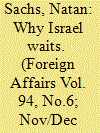

|
|
|
|
|
| Summary/Abstract |
Israeli national security strategy can seem baffling. Many observers in the United States and Europe, for example, wonder how Israeli Prime Minister Benjamin Netanyahu could have warned for years that Iran’s nuclear program posed an existential threat to Israel yet has balked at the international community’s attempts to defang it. By raising concerns about the nuclear deal between Iran and five great powers without offering a convincing alternative, Netanyahu has appeared to oppose any solution at all. Instead, as Philip Hammond, the British foreign secretary, said in July, Netanyahu is acting as though he would prefer a “permanent state of standoff” with Tehran.
|
|
|
|
|
|
|
|
|
|
|
|
|
|
|
|
|
|
|
|
|